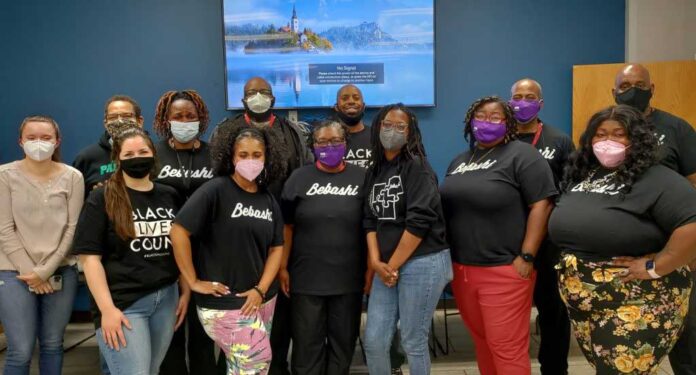The team at Bebashi Transition to Hope continues to provide a safe spaces for transgender and gender nonbinary people of color through the support group The Healing Place, part of the organization’s Melanin Magic program. Melanin Magic offers a variety of services to trans and gender nonconforming folks, including access to Bebashi’s Trans Necessities Closet, HIV/STI testing and PrEP.
A’hmea Branch, trans woman of color and former prevention navigator at Bebashi, created The Healing Place in the fall of 2021, before moving on to a new job.
“After starting at Bebashi, I saw there was a need for a support group for people who identify like myself,” Branch said in a press release. “I hope The Healing Place helps empower people of color in the trans community.”
Following Branch’s departure from Bebashi, the facilitators of the support group decided to put meetings on hold for the month of January to get the word out about the group, come up with a new name for it and consider community feedback before they bring back a stronger version in February.
“We just want to expand a little bit more, get people interested, get the word out that we’re here and we’re open to the Black and Brown community, for men and women of trans experience and [gender nonconforming] people, said Keisha Gabbidon-Howell, prevention education supervisor at Bebashi. “We want to bring in more folks to partake.”
She said that initial support group meetings were going well and that the group facilitators got some good feedback from community members.
“We’ve had some light discussions, we’ve shared food, we’ve had some laughs,” Gabbidon-Howell said. “We want to get a little bit deeper as we make the program a little bit more robust.”
During the first meetings, attendees told Bebashi staff what they would like to get out of the support group. Most notably, they suggested that Bebashi partner with other community organizations that produce similar programming to avoid duplicate services, and that group attendees continue to provide access to the Trans Necessities Closet, Gabbidon-Howell said.
Through the Trans Necessities Closet, trans and gender nonconforming people can access clothing and gender-affirming items they need to live authentically, including shoes, wigs, binders and gaffs, as well as referrals for primary care, PrEP and medical case management. Bebashi staff also plan to make the organization’s pantries available for those who attend meetings to pick up some groceries.
“It’s a commitment of Bebashi’s to make sure that the communities that we serve have buy-in, that we are listening to the voices of the people who are impacted,” Gabbidon-Howell said. “We can’t continue to provide services that we think are appropriate or necessary, we have to hear from the community.”
Branch created The Healing Place in response to rampant discrimination and violence toward trans people, especially trans people of color, according to a press release from Bebashi.
In Philadelphia and beyond, trans people continue to face barriers in many aspects of everyday life. Panelists who spoke at the November event Supporting Trans Communities conveyed that homelessness and unemployment are two enduring issues for trans folks. Transphobia in healthcare settings came up as another ongoing problem.
“We want to close some of the gaps that our communities face,” Gabbidon-Howell said. “By doing so we want to combat HIV and AIDS; we want to help with the hunger issue in Philadelphia, specifically in our communities. We know a safe space is needed so that we can hear more about the needs and try to address them so we can try to close those gaps in those Black and Brown communities.”
Consideringing that COVID-19 cases have dramatically increased in recent weeks, Gabbidon-Howell said that the team is working on incorporating a virtual meeting option.
“It is a challenge, but we’re going to try to make sure we put a lot of protective methods in place,” she said. “We are following guidelines and trying to still meet the needs of the community.”
The support group is a collaborative effort of other members of Bebashi’s prevention team, including Mx. Trinitee Wilson, Diamond Jack, who goes by DJ, and Eira Manzano.
To inquire about the support group, visit Bebashi.org or email Keisha Gabbidon-Howell at [email protected].

